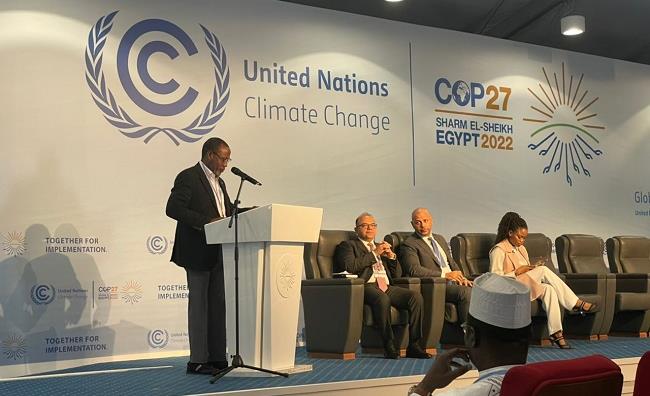Nigeria’s Minister of Environment, Mohammed Abdulahi, has called on African leaders to take decisive action to mitigate the impact of climate change, as the continent is at a critical time with respect to the world’s climate future.

The Minister made this assertion on Tuesday, November 8, 2022, while addressing African leaders during the launch of the African Carbon Market Initiative (ACIM), a side event organised by the Climate Action at COP27 taking place in Egypt.
He said: “Our actions today and over the next few decades will determine the fate of future generations and the planet. This year, we witnessed disastrous extreme weather events from terrifying wildfires in the United States, to unprecedented heat waves in India, Pakistan, and Europe, to powerful floods in my country, Nigeria. These devastating floods have affected about 33 states, displacing over 1.4 million people, destroying over 100,000 hectares of farmland and causing about 600 deaths.
“In addition, we are witnessing increased desertification, erosion, and pollution; the impacts of which are too severe to ignore. These glaring climate signals indicate that we do not have the luxury of time when it comes to the impacts of climate change.”
Speaking further, the Minister emphasised that Africa, despite contributing the least to both historical and current emissions, bears the brunt of the impact of climate change to a disproportionate level, hence the case for accelerated climate action.
He, therefore, called on African leaders to strongly demand urgent and decisive climate action from the developed countries that are most responsible for the emissions that cause climate change.
“We cannot afford any more delays; our people and nations are on the line,” he stressed.
Elucidating the efforts of the President Muhammadu Buhari-led administration at mitigating climate change, Abdullahi revealed that Nigeria submitted a highly ambitious Nationally Determined Contributions (NDCs) and is spending up to 9% of its GDP in addressing climate change, adding that, in 2021, Nigeria became the first African country to design a detailed Energy Transition Plan to tackle the dual crises of energy poverty and climate change and deliver universal access to energy (SDG7) by 2030 and net-zero by 2060.
While calling the attention of investors and the international communities to the investment opportunities inherent in the Energy Transition Plan of Nigeria, the Minister advocated continued global collaboration in the drive to tackle climate change.
“I call on investors and the global community to recognise the immense investment opportunities and potential for impact in Nigeria and the Global South at large. Let’s come together at this crucial time in the world’s history to deliver a just, clean and thriving world,” Abdullahi posited.
